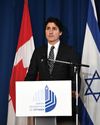The challenges of international negotiations with a reality-TV star

IN SEPTEMBER, just a few weeks before the revised North American Free Trade Agreement was signed, Chrystia Freeland walked onto a Toronto stage to a standing ovation. The Canadian foreign affairs minister was the star of a panel criticizing populist politics and “authoritarian strong men.” This event, dubbed Taking on the Tyrant, cast Freeland as the feminist hero fighting a crass, pussy-grabbing villain. It also helped send a clear political message — one Ottawa wanted to broadcast over its months-long, contentious talks with the United States to replace the original twenty-four-year-old NAFTA: by standing up to a bully, Freeland was protecting the values of our liberal, multicultural democracy and, indeed, our very Canadianness.
The NAFTA talks weren’t a renegotiation of a trading partnership as much as a show of power — a reminder, on the world stage, of which country has the most of it. Trump had made reforming NAFTA an issue on his 2016 presidential campaign, a dramatic show of his ultrabusinessman brand, and a key pillar of his closed- borders, America-first, MAGA view of the world. His reality-TV style of politics, however, pushed negotiations with Canada and Mexico beyond the financial arguments that undergird the normal give and take of competing interests and into outright fake news. There was little acknowledgment by Trump, for example, that withdrawing from NAFTA would put the US economy in serious jeopardy. Or that, as of 2016, US trade was responsible for 41 million jobs, accounting for 22 percent of the country’s employment.
This story is from the December 2018 edition of The Walrus.
Start your 7-day Magzter GOLD free trial to access thousands of curated premium stories, and 8,500+ magazines and newspapers.
Already a subscriber ? Sign In
This story is from the December 2018 edition of The Walrus.
Start your 7-day Magzter GOLD free trial to access thousands of curated premium stories, and 8,500+ magazines and newspapers.
Already a subscriber? Sign In

Invisible Lives
Without immigration status, Canada's undocumented youth stay in the shadows

My Guilty Pleasure
"The late nights are mine alone, and I'll spend them however I damn well please"

Vaclav Smil Is Fed Up
The acclaimed environmental scientist is criticizing climate activists, shunning media, and stepping back just when we need him most

It's Time for a Birth Control Revolution
What the pill teaches us about the failure - and future - of women's health care

Would You Watch a Play about Hydro Electricity?
How documentary theatre struck a chord in Quebec

Still Spinning
One record chain has bet big on a new appetite for physical media

Just So You Know, I Love My Mother
In many ways, multi-generational living makes sense. But that doesn't make it easy

Art of the Steal
Why are plundered African artifacts still in Western museums?

Canada in the Middle
What role can we play in easing the war in Gaza?
Canadian Multiculturalism: A Work in Progress
As we mark fifty years since the adoption of Canada’s federal multiculturalism policy, human rights advocate AMIRA ELGHAWABY celebrates its merits and reflects on the work that is yet to be done when it comes to inclusion, acceptance, and fighting systemic racism in our country.